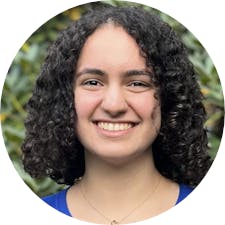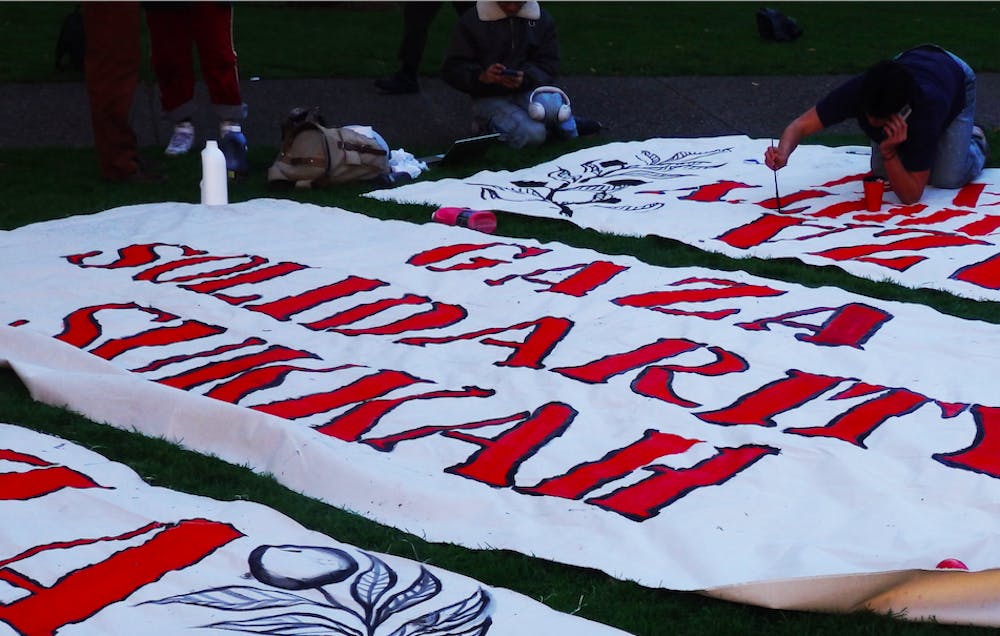Early Tuesday morning, members of Jews for Ceasefire Now were threatened with conduct violations by the Department of Public Safety for sleeping in a temporary structure that they had built to celebrate the week-long Jewish holiday of Sukkot.
The group erected the sukkah, a tent-like structure that Jews use for holiday traditions such as eating meals and sleeping, on the Quiet Green last Wednesday. While the construction of the sukkah was sanctioned by the University, administrators told the group Wednesday evening that sleeping in the structure was not permitted under Brown’s green space usage policy.
University Spokesperson Brian Clark wrote that the group’s requests to build the sukkah “indicated no plans for sleeping in the structures, and the University approvals provided were for the short-term use of space on the greens, provided the students adhered to Brown policies.”
On Thursday evening, DPS officers told JFCN members they were not allowed to be within 20 feet of the structure between 2 a.m. and 6 a.m, according to a Wednesday press release from JFCN that also said the warning did not refer to a written policy. Clark did not specify why students could not be in the sukkah during that time, but he noted that students were barred from sleeping in the sukkah due to the green space usage policy and fire safety directives.
JFCN abided by this policy for the first four nights of the holiday before deciding to sleep in the sukkah on Sunday night, which proceeded “without incident,” according to their press release. It was not until their second night in the sukkah that they were threatened with conduct violations.
Eden Fine ’25, a member of JFCN, said that the group explicitly expressed their intent to sleep in the structure in their request to erect the sukkah on University grounds. In an email exchange that was reviewed by The Herald, an administrator told JFCN organizers that this intent was not communicated to the University officials that had approved the request.
“Brown’s supposed commitment to protecting free expression and students of all religious stripes is fundamentally at odds with their threats and restrictions on this religious practice,” JFCN wrote in their press release. “The administration continues to contort the University’s intentionally opaque policies to repress student expression and religious practice.”
The University’s green space and fire safety policies “are related to the time, place and manner of requests and have no relationship to content or religious practices,” Clark wrote.
Setting up sukkahs is “something that happens on this campus every year,” Fine said. They noted that Rabbi Lex Rofeberg ’13, who has provided rabbinical support for JFCN, told the group that he used to sleep in a sukkah on Brown’s campus when he was a student.
The permissibility of sleeping in temporary structures on Brown’s greens has become particularly relevant since demonstrators erected a week-long encampment in support of divestment last spring. At the time, Brown cited its green space policies in issuing conduct violations to encampment participants.
Sleeping on the University’s green spaces is in violation of “long-standing Brown policy,” Clark wrote. While students have erected sukkahs in previous years, there have been “no exceptions for sleeping in those cases or any other,” he added.
Simon Aron ’28, a JFCN member, said that abiding by warnings not to sleep in the sukkah from Wednesday through Saturday, he “didn’t want to be bullied by the administration out of practicing my Judaism.” Aron said that he and other JFCN members “were willing to face the consequences” of spending the night in the sukkah.
After DPS collected the students’ names and ID numbers, Aron said the group went back to sleep. The students were told they would undergo a conduct review process, but were not given any indication of what their specific consequences could be, Aron said.
“I love being Jewish so much,” he added. “And it feels awful that an institution like Brown University would try and suppress my Judaism.”

Ciara Meyer is a section editor from Saratoga Springs, New York. She plans on concentrating in Statistics and English Nonfiction. In her free time, she loves scrapbooking and building lego flowers.

Sophia Wotman is a University news editor covering activism and affinity & identity. She is a junior from Long Island, New York concentrating in Political Science with a focus on women’s rights. She is a jazz trumpet player, and often performs on campus and around Providence.





